- Home
- Gavin Chappell
The Gladiator Gambit
The Gladiator Gambit Read online
The Games of Hadrian
The Gladiator Gambit
GAVIN CHAPPELL
Copyright © Gavin Chappell 2017
Cover art by Curiosito
All illustrations provided under license from Wikimedia.
All rights reserved. No part of this book may be reproduced or transmitted in any form or by any electronic or mechanical means, including photocopying, recording or by any information retrieval system, without the written permission of the publisher and author, except where permitted by law.
The right of Gavin Chappell to be identified as the author of this work has been asserted by him in accordance with the Copyright, Designs and Patents Act 1988.
Published by Schlock! Publications 2017
ISBN-13: 978-1979083003
ISBN-10: 1979083002
This book is a work of fiction and any similarities to actual persons and/or places are purely coincidental.
Schlock! Publications
www.schlock.co.uk
In the same series:
On Hadrian’s Secret Service
Murder in Hadrian’s Villa
The Hadrian Legacy
Our Man in Alexandria
And by the same author:
Crocodile and Leopard
The Man Who Sold the Roman Empire
Prologue
Nicopolis Amphitheatre, Alexandria, Roman Province of Egypt, 25th August 124 AD
The sun blazed down upon the burning sands of the arena.
The gladiators strode out from the darkness to meet a roar of acclaim from the mob. In the shade of the imperial box sat the prefect of Egypt, Haterius Nepos, with his coterie of imperial bureaucrats, austerely watching the four men and one woman as they advanced into the harsh sunlight. The sands were strewn with gory debris from the venators’ beast fights of the morning and the public executions at noon. The rank copper stink of blood hung in the air, blowflies buzzed around pink and scarlet heaps of viscera.
The gladiators’ sandaled feet crunched in the grit, the light of early afternoon glanced from their brassy helmets and armour, beat down on their tanned flesh. One man, a murmillo, clad in visored helmet with a wide flaring neck piece, was a Nubian, his skin black as if burnt by the suns of the desert. In his left hand he held an oblong shield, a sword in his gauntleted right; otherwise he was naked except for a brief white kilt and high strapped sandals. The roar of the crowd grew as he lifted his sword.
Next was an olive-skinned Greek in the gear of a retiarius, a trident in one bare hand. The other, clad in a gauntlet, gripped a fisherman’s weighted net. His youthful face was handsome and feline, and he wore his black hair in ringlets. As he brandished his trident in greeting, catcalls and wolf whistles broke out from the cheap seats at the back. He stumbled suddenly, and had to use the trident butt to stop himself from falling flat on his face.
The cries increased as the next gladiator joined them, this one a secutor, clad similarly to the murmillo with a helmet, holding an oblong shield in one hand and a sword in the other. Although this gladiator was as tall as the rest, the helmet was forged in the form of an Amazon’s face. Bare breasts made it clear that this was a gladiatrix—a female gladiator.
The roars of applause reached fever pitch as the second to last gladiator stalked forward. This was a man older than the rest, in his mid-thirties; no longer a boy but not yet running to fat, he carried a small buckler in his left hand and a curved sword in his right. On his muscular calves he wore greaves, on his sword arm an armguard and gauntlet, and on his head a visored helmet with a plume. The crowd grew wild with enthusiasm, flinging down flower petals as this Thracian advanced towards the imperial box. Now the gladiators, all but one, stood in a crescent, facing the prefect of Egypt.
The last of them took his place and the applause ebbed away as if he was a newcomer, an unknown quantity. Like the Thracian he wore a plumed helmet, and carried a circular shield, but instead of a sword he held a long spear. On his right arm and his legs he wore the mail of a hoplomachus.
As the five gladiators raised their weapons towards the imperial box, the sun flashed from their blades. They roared out the traditional words, ‘Those about to die salute you!’ and at a flourish of trumpets, turned to face the great archway on the other side of the arena.
With a screech of metal, the gates swung open. In galloped ten horsemen wearing scale mail, carrying oval shields and lances, their helmets ornamented with feathers.
As the arena echoed with the drumming of hoofs the hoplomachus stood in line with his comrades, awaiting the inevitable attack. He peered anxiously through the eyeholes of his helmet, biting his lip.
The sun beat down on his tanned flesh, on the tattoo on his chest. It was hard to breathe inside this visored helmet. He was indeed a newcomer, having replaced a gladiator recently lost by the impresario Apuleius Victor. This was by no means his usual line of work, and he dreaded what was coming. He lifted an armoured gauntlet to brush sweat from his brow, then halted, realising the futility of this gesture.
As the roar of the crowd grew and the horsemen thundered across the sand, lances glittering, Gaius Drusus Flaminius, imperial agent, commissary tribune of the Twenty Second Legion, gripped his spear in nervous anticipation.
—1—
Patrol Station Isideion, The Thebaid, Province of Egypt, 20th July 124 AD
Flaminius’ armour shone in the bright desert sun, his horse’s hoofs drummed on the rock as he rode past the running robber. His longsword descended. A shock travelled up the sinews of his arm as the blade sank into the muscles of the man’s back. The robber dropped to the rock. Blood soaked into the grit as his heels drummed out a final tattoo.
The rest of the robbers had vanished into the shadows of the rocks at the head of the defile. Turning in his saddle Flaminius shouted to the Arab auxiliaries: ‘After them! Bring at least one back alive!’
The Arabs rode past, white robes flapping about them. Flaminius dismounted and, leading his nervously snorting stallion by the reins, went to inspect the robber he had cut down.
The man was dead. Flaminius rolled him over with a sandled foot, peering at the masculine features beneath the black wig of long, sleek, womanish hair. All Egyptians, male or female, wore kohl, but few men affected cosmetics as whorish as this one’s. A long linen dress and cheap bangles on his arms completed his bizarre, effeminate ensemble.
The Egyptian robbers who infested the edge of the arable districts practised magical rites darker than the worst superstitions of the druids. It was believed that by dressing as a woman, a man could make himself invulnerable. Being neither man nor woman, neither one thing nor another, he effectively ceased to exist, and so could not be harmed. Such was the crazy logic that inspired these men. The man had not been invulnerable to Flaminius’ cavalry longsword. Someone should have suggested armour. It was too late for the dead man—but what was this?
Incongruously, on his right arm the man wore a heavy bronze armguard, the kind worn by gladiators. And the curved sword that lay a few feet away, where the robber had dropped it, was the sort carried by the class of gladiator known as a Thracian.
Flaminius went over to examine it.
The rocky defile resounded to the clatter of hoofs. Flaminius looked up to see two of the Arabs riding back in a cloud of dust. They reined their steeds a few feet away, the decurion of the troop and another.
The decurion panted, ‘We found their camp, sir. There was a fight. We killed them all.’
Flaminius straightened up. ‘Did you not leave any alive?’
The Arab met his gaze imperturbably. ‘My men wanted to kill them all when they found…’ He faltered, looked away and spat into the sand. ‘You must see for yourself.’
&nbs
p; Flaminius mounted his horse. ‘Take me there!’
The Arabs led him back up the defile. They crested a rise and a small plateau opened up before them. The rest of the mounted Arabs clustered round the base of a large rock. The bodies of the robbers were scattered about the sand. Beneath the rock was the remains of a campfire. As he reined his horse, Flaminius saw bones lying in the cold ashes. His gorge rose. A human rib cage…and three skulls.
‘It’s true, then,’ he muttered. ‘The rumours are true.’
The decurion swung down from his horse and went to the firepit. ‘Show the tribune,’ he barked. One of the auxiliaries knelt down and lifted up a charred gobbet of flesh from the embers. It was a half chewed human heart.
‘They think that if they eat the hearts of their enemies, they will gain their enemies’ strength,’ the decurion said.
‘Thank you, I’ve read the reports,’ Flaminius muttered. He dismounted and inspected the fallen robbers. ‘What’s this?’ he said suddenly.
The decurion came to join him. Flaminius was pointing at a dead robber. The man wore the highly elaborate helmet of a gladiator—a murmillo.
‘Shades of Spartacus and all his kind,’ Flaminius swore. The decurion looked blankly at him. ‘I’m going back to the patrol station.’ The tribune picked up the helmet. ‘The legate will want to hear about this. Remain on patrol. If you encounter any more of these robbers, try to take at least one alive. We’ll want to question them.’
He strapped the gladiator helmet onto his saddle then remounted and rode away in a whirlwind of dust.
‘Gladiators?’
Avidius Pollio, legate of the Twenty Second Legion, gazed up at Flaminius in concern. His eyes turned in perplexity to examine the helmet.
‘Gladiator armour, yes,’ said Flaminius. ‘The first one I killed was wearing a Thracian armguard and gauntlet.’
‘Pity you didn’t bring any of them back alive,’ the legate mused. ‘The best way to get to the bottom of this would be to ask a few probing questions.’
He rose and went to the map table. Carrying the gladiator helmet under his arm, Flaminius joined him. Together they examined a chart that showed the Thebaid, the southern administrative divisions, or nomes, of the Roman province of Egypt.
‘These attacks have been growing in boldness,’ said the legate. His finger stabbed at a spot on the map. ‘Here’s Isideion, slap bang in the middle of this turbulent region. We’ve had attacks all along the eastern border, even some on the edges of the Memphite Nome. But they’ve been focussing on our forces in the Thebaid, and so we’ve been concentrating our efforts here. Are these just the usual raids for food and plunder, or by all the gods is it the beginning of a concerted campaign? A wholesale rebellion?’
The native Egyptians were subject to swingeing taxation. Many were unwilling or unable to pay, and in their extremity, these tax evaders took to the desert or the inaccessible parts of the Delta, to live as robbers and river pirates. It had been this way since long before the Romans took over the running of this most ancient of countries, since the days of the Pharaohs; in Flaminius’ private opinion, it was high time there were changes.
‘And where do gladiators come into it? Where’s the nearest amphitheatre?’
Avidius Pollio grimaced, and ran fingers through his sparse grey hair. ‘There are very few in Egypt. The country is entirely too barbaric. We’re having to open the legion’s own private amphitheatre outside Alexandria to the public just to celebrate the Games of Hadrian next month. That’s two weeks’ journey downstream.’
Too many Greeks and not enough Romans, that was the problem with Egypt. The civilised Greeks turned up their nose at the professional violence of the arena, preferring gang warfare and rioting at the races in the hippodrome.
‘In which case, what is gladiator armour doing in the Thebaid?’ He placed the helmet on the map table and studied it closely, tracing out a short inscription. ‘Are these fugitive slaves, joining the robbers? Or has the armour somehow wound up on the black market?’ He peered closely at the elaborate visor.
Avidius Pollio sat down on a camp stool. ‘I don’t need to remind you, tribune, that this is the worst possible time for us to face another uprising. You weren’t stationed here when the Judaeans were on the rampage. I was; it was my introduction to the country.’ He shook his head. ‘A terrible time. Corpses clogged the canals and irrigation channels, the cities went up in flames. His imperial majesty tried to tidy up after the rebels were crushed, but it’s not the same country anymore.
‘What’s more, security has been stepped up. Travel about the countryside is subject to any number of checks. Patrols of legionaries are everywhere; every town and village has its native guards, and out in the desert are any number of patrol stations like Isideion. And yet the border with the desert is permeable. Unless we were to build a wall like the one his imperial majesty has begun in Britain, it will be thus until the world ends. All the same, we can pursue raiders and fight nomads whenever they make their incursions. We are ready for that. What we cannot face is another rebellion like the Judaean Uprising.’
‘The Judaeans are in no position to rise again,’ Flaminius pointed out, ‘not in Egypt.’ He’d met some of the Judaeans still living in the suburbs of Alexandria; a quiescent lot, they were eager to keep the peace.
‘Nevertheless,’ said the legate, ‘this is a dangerous country. You and I know the secret of the empire.’
Egypt was a rich province. Its arable land, fertilised by the inundation of the Nile, produced much of the grain that kept the Roman mob fed—and the emperor in power. But as rich as it was, as vital as it was to the entire empire, Egypt was vulnerable. Only the most trusted men in the Senate, such as Avidius Pollio, were permitted to enter the country, and it was under strict lockdown.
People still remembered how Vespasian of Divine Memory seized Egypt and blockaded it, cutting Rome off from its grain supply, and using this position of power went on to make himself emperor. He replaced a tyrant, and ruled wisely for the most part. But any man with enough influence could achieve the same coup, and the stability the empire was now enjoying would be threatened once again. Nobody wanted that—nobody except ambitious senators who would benefit from chaos.
Rising, Avidius Pollio beckoned Flaminius to follow him.
The courtyard was hot and dusty. The sun was over the ramparts where Arab auxiliaries stood in armour that glittered in the receding light. The legate went to the nearest ladder and Flaminius followed him up into the watchtower. Here two auxiliaries stood looking out across the desert.
Both saluted on seeing the legate’s approach. ‘Nothing to report, sir,’ said the senior of the two. ‘It’s quiet.’
‘At ease, men,’ said Avidius Pollio crisply. Going over to the bulwark he gazed out across the endless sands. Flaminius joined him. Nothing could be seen except the shimmering heat haze, and high up in the sky, a single dot. It must be a hovering hawk.
‘It’s quiet,’ said Avidius Pollio. ‘Too quiet? Seems to me that something is going on. Out there,’ —he gestured ominously at the barren sands— ‘something is brewing.’
He turned to Flaminius. ‘You know that next month the province is celebrating the Days of Hadrian?’
Flaminius nodded. This was a ten-day festival celebrating the province’s liberation from the Judaean rebels. Sacrifices were offered in the temples, feasts and banquets were held, plays were performed in the theatres, there were chariot races every day in the hippodrome and the gladiatorial Games of Hadrian were fought in the amphitheatre.
‘Not a time, surely,’ he said, ‘when people’s thoughts turn to rebellion.’
Avidius Pollio shook his head. ‘What better time for disruptive elements to strike? Out there’—he indicated the desert again— ‘forces are gathering, mustering their strength against us. Out there are Libyans, Nubians, Egyptian renegades and more. All with their eyes on the riches of the province. What better time to descend than when the people are celebr
ating?’
‘The Libyans hate us, the Nubians hate us, the Egyptians hate us,’ Flaminius said. ‘The Judaeans hate us! Who in this land doesn’t hate Rome?’
The legate shrugged. ‘The Greeks, perhaps, can be trusted. They don’t hate us like the barbarians do; they know that they can patronise us, because we idolise their culture. Besides, they’re too caught up in their loathing for the Judaeans to resent our rule—it’s a failing in them that we’ve encouraged. Divide and rule, eh, young man? But perhaps even they could become enemies.’
‘We certainly seem to have an enemy within.’ Flaminius tapped the helmet he had brought from the legate’s office.
Avidius Pollio nodded. ‘It’s about time I shared with you something that is known only to myself and the prefect. His imperial majesty is coming.’
The emperor had been proceeding through Asia Minor. Egypt lay to the south of his route. Five days’ sail would take him from Smyrna to Alexandria. Two years had passed since Flaminius had last spoken with Hadrian, and they had not parted amicably. ‘Why is he coming here?’
‘He intends to appear at the height of the celebrations,’ said the legate. ‘A surprise visit will be the crowning glory; an appearance in the imperial box of the amphitheatre. It will be a statement of his power over the province, a reminder that Rome rules in this country.’
‘But…’ Flaminius began.
The legate nodded. ‘Yes, young man,’ he said. ‘If he arrives in the middle of an uprising…’
Flaminius looked out over the baking sands, and a chill stole over him. He lowered his voice. ‘You don’t think… they know?’ he said. ‘Whoever it is. Whoever is behind these attacks. You don’t think they know that the emperor is coming to Egypt?’

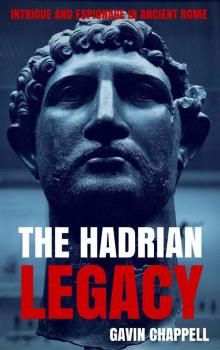 The Hadrian Legacy
The Hadrian Legacy On Hadrian's Secret Service
On Hadrian's Secret Service Murder in Hadrian's Villa
Murder in Hadrian's Villa The Sword of Wayland
The Sword of Wayland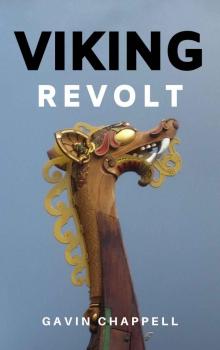 Viking Revolt
Viking Revolt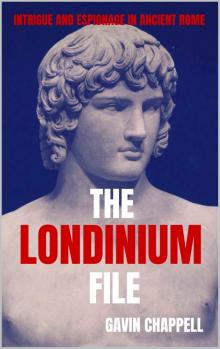 The Londinium File
The Londinium File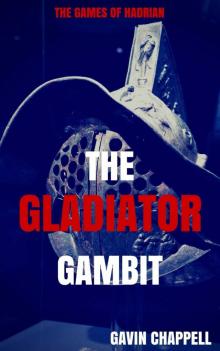 The Gladiator Gambit
The Gladiator Gambit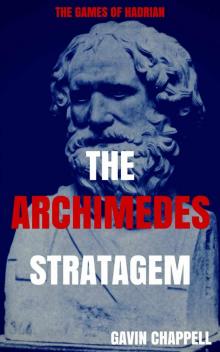 The Archimedes Stratagem
The Archimedes Stratagem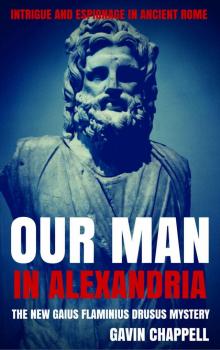 Our Man in Alexandria
Our Man in Alexandria Into the Void (The Dungeoneers)
Into the Void (The Dungeoneers)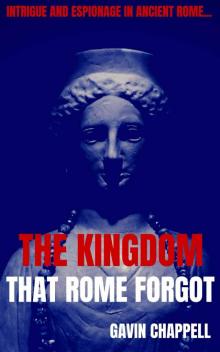 The Kingdom That Rome Forgot
The Kingdom That Rome Forgot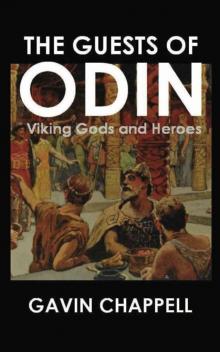 The Guests of Odin
The Guests of Odin